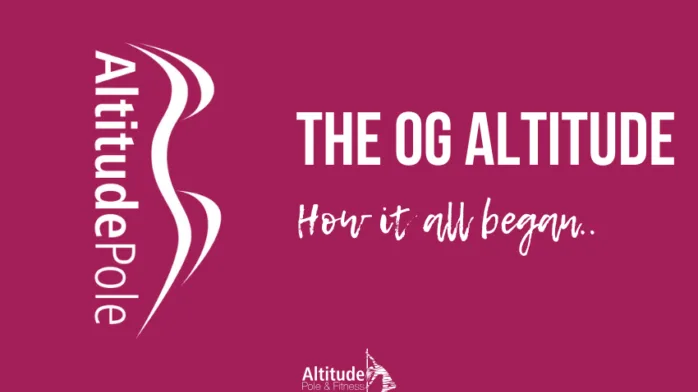
Pole Dance Roots: Celebrating Pole Dancing's Journey from Clubs to Studio
This month we're celebrating the roots of pole dancing in strip clubs, and taking a moment to show our appreciation to our stripper sisters for pioneering our beloved sport, and for inspiring many of our members to give pole dancing a go! Many a pole dancing enthusiast has signed up thanks to a cheeky strip club visit - being wowed by the sensuality, confidence and badassery up on that podium!
As we embrace the art and athleticism of pole dance at Altitude, it's essential to recognize the rich and diverse history from which our beloved fitness form emerged. Pole dancing has become a modern-day sensation for its fun take on fitness and unique ability to build confidence in its enthusiasts. Its roots in strip clubs are a testament to its enduring allure as an empowering athletic pursuit.
In this blog post, we'll embark on a journey through time, exploring the origins of pole dancing, its expansion into a fitness phenomenon, and what it represents today.
Embracing the Origins
Pole dancing, in its earliest form, found its home in the vibrant atmosphere of strip clubs. Its sultry and seductive nature was captivating, and it quickly became an integral part of the rise of the adult entertainment culture in the 1960s.
The pole was initially used as a prop, adding an extra layer of excitement to the performances. It provided dancers with a unique platform to showcase their strength, grace, and creativity, drawing in audiences from all walks of life.
The origins of pole dancing are undoubtedly connected to the strip club scene, and it is essential to acknowledge the skill and dedication of these dancers. They demonstrated incredible athleticism, grace, and showmanship, which continues to inspire us in our pole journey today. We are eternally grateful for the early pole studio pioneers for making pole dance available to the general public.
Some sources will talk about pole dancing originating from ancient times, via Indian Allakhamb or Chinese Pole, however, the apparatuses of these disciplines are far removed from the slim metal poles we know and love today (and were exclusively male sports!).
Modern-day pole dancing was born in strip clubs and has been infused with various styles of dance, gymnastics and acrobatic techniques.
The Emergence of Pole Dancing Lessons
The transition from exclusive performances in clubs to a more mainstream fitness activity was gradual. As the art form gained recognition for its physical benefits, many enthusiastic individuals sought to learn the discipline. It was during this time that pole dancing lessons started to appear.
In the 1990s, Fawnia Mondey, a renowned former stripper, and instructor, opened one of the world's first pole dancing studios, open to the public, as well as producing seven popular instructional pole dancing DVDs. This marked a pivotal moment in the history of pole dancing, where it began to take a more structured and educational form.
Mondey's contributions, along with those of other early pioneers such as Sheila Kelley and Alena Downs, helped pave the way for pole dancing as a fitness activity for everyone, regardless of their background or experience, as well as helping strippers learn their craft in a safe and controlled environment.
The emergence of pole fitness studios brought about a shift in the world of pole dancing. With the rise of pole fitness studios, pole dancing emerged as an empowering form of exercise accessible to people of all backgrounds. These studios embraced the athleticism, artistry, and body positivity aspects of pole dance. Enthusiasts flocked to these safe and inclusive spaces to explore their strength and creativity.
The Introduction of Competitions
Pole dancing competitions emerged as a natural progression, combining the artistic and athletic aspects of this mesmerizing discipline. In the early 2000’s, pole dancing competitions started popping up globally, allowing enthusiasts to connect and evolve together. Competitions not only celebrate the talent and dedication of pole dancers but also promote camaraderie within the community.
Pole Dancing Today: A Celebration of Strength and Grace
Today, pole dancing stands as a testament to the incredible journey it has taken from its roots in strip clubs. It has evolved into a holistic fitness activity, celebrating strength, flexibility, and artistry. Pole dancing studios provide a safe space for people from all walks of life to learn and grow together - plus, pole dancing is hella fun!
Pole dancing is an art where you're free to choose your own adventure, whether that's embracing its sultry and seductive allure or opting for a sportier approach. There's no "one size fits all" in pole dancing; it's about crafting your own experience and celebrating the diversity of this art form. What truly matters is our acceptance and open-mindedness, embracing all aspects of pole dancing.
We aim to remember and respect the roots of pole dancing in strip clubs. The dedication, artistry, and empowerment of the dancers who came before us laid the foundation for the pole fitness community we cherish today. By recognizing pole dance's origins in strip clubs, we can appreciate the unique and beautiful journey that has brought us to Altitude, where we can explore our own potential in a judgement-free, inclusive, and inspiring atmosphere.
In conclusion, pole dance's roots in strip clubs are a part of its rich history that we should celebrate without judgment or bias. By acknowledging the diverse journey of pole dancing, we can embrace its evolution into the incredible art and fitness discipline it is today. At Altitude, we continue to carry forward the tradition of strength, grace, and creativity, building on the legacy of those who came before us.
Cited Sources:
"Pole Dancing: Empowerment and Embodiment" by S. Gibson and L. McKenzie
"The History of Pole Dancing" - Pole Dance Community
"Pole Dancing: Bodies, Gender, and the Politics of Sex Work" by K. Holliday
"The History of Pole Dancing" - PolePedia
"Evolution of Pole Dance" - StudioVeena
"Pole Dance History" - X-Pole
These sources provide a foundation of knowledge on the history and evolution of pole dancing, as well as the impact of pole fitness studios on the strip club industry.





